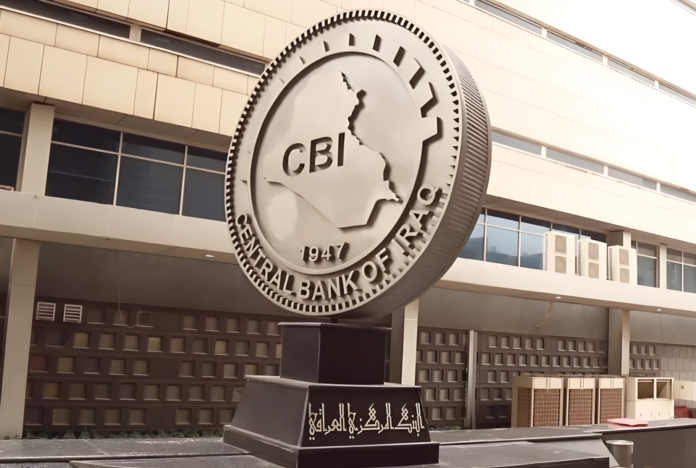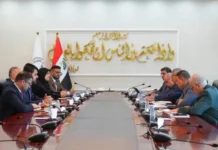An informal Iraqi monetary report revealed a significant decline in the security of private area stores by 12 neighborhood banks compared with a notable increase in the percentage of banks having banking relationships with American monetary organizations. This change is seen as a pivotal turning point in the Iraqi financial landscape and changes the financial sector but also drastically influences the Iraqi economy generally and on daily activities of people.
The climb of US-affiliated banks
Three Iraqi keeps money with journalist associations linked to US banks represented around 47% of complete confidential area stores in the Iraqi financial framework in the principal half of 2024, a significant increase from the 34% they represented in 2019 according to a report given by the Iraq Future Starting Point for Financial Examinations and Meetings. By comparison, the percentage of deposits kept by domestic banks without foreign financial ties dropped from 42% in 2019 to 36% by the middle of 2024.
With US-connected banks predicted to account for over half of private area retailers until the end of 2024, this trend is supposed to worsen. The Central Bank of Iraq admits that the dependence on correspondent banks for outside transactions greatly affects the way deposit shares are distributed. Still, this change has wide effects for the Iraqi people and their financial system.
Effect on the Iraqi economy
Trust lost in surrounding banks The result of certain factors, including debasement and liquidity possibilities, is the decline in stores in local banks requiring US reporting. Master Abdulrahman Al-Shaikhli of banking made sense of this debasement in these institutions that compromises banks’ credibility among contributors. This can limit banks’ ability to keep up with liquidity and attract stores, therefore compromising their role in boosting the economy.
This lack of confidence could aggravate Iraq’s liquidity issue by restricting capital flows to nearby companies and so impeding economic development. When private banks fail to act with assurance, individuals and businesses may choose elective financial decisions or stop from saving, therefore limiting the available capital for loan and investment.
Capital is focused upon Rising strength of U.S.-connected banks is driving a centralization of capital in some foundations, maybe leading to monopolistic trends in the Iraqi monetary scene. These banks may offer more stability because of their worldwide ties, but they may also lower market competitiveness, therefore causing inefficiencies. This concentration could cause small and medium-sized companies in Iraq depending on local financial institutions to pay more borrowing costs.
In an economy like Iraq, where growth away from oil is basic, the financial area takes front stage in supporting new sectors. Basic for long-term reasonable development, powerless local banks could impede supporting of important sectors including farming, manufacturing, and non-oil trades.
Resting admission to financial institutions The collapse of neighborhood banks suggests that many Iraqis, particularly in provinces or underbanked areas, could face less access to basic financial institutions. Banks teamed with US companies might hone in on massive clientele, therefore depriving private businesses and individual contributors of options. This could increase monetary avoidance, therefore making it more difficult for regular financial exchanges, credit acquisition, or cash setting aside for ordinary Iraqis.
Moreover, reputational opportunities connected with debasement in few local banks could make people reluctant to run these businesses, therefore limiting their ability to participate in the traditional economy. This could encourage more people to use informal financial channels, therefore increasing the hazard of extortion or misfortune and so degrading the general soundness of the economy.
The continuation of dealers and private area assistants Retailers also expressed their interests on the difficulties they have controlling money flows through Iraqi banks. Ahmed Al-Fahd, a member of the Organization of Offices of Business in Baghdad, pointed out that in certain situations arriving at 10 days, the systems linked with monetary exchanges on the electronic level are sometimes confused and tiresome. This affects deferrals and susceptibility for businesses depending on fast exchanges to complete worldwide trade activities, especially with relation to imports.
This low efficacy in the financial framework drives many dealers to seek cash exchanges or global financial options, therefore undermining confidence in local financial institutions and entangles efforts to screen monetary streams and guide them as per global standards.
Fundamental steps to modernize the financial sector are the CBI’s adjustments, which intend to extend electronic monetary exchanges and provide new benefits to contributors. Stronger initiatives to fight corruption, boost openness, and rebuild confidence in local institutions, however, should go alongside these ones. Without addressing these fundamental problems, the divergence between American-connected institutions and surrounding banks could grow, leading to a financial framework divided as some foundations command the market while others struggle.
This situation of development challenges the general security of the Iraqi economy. Encourage speculation, help organizations, and build public confidence in the monetary framework by means of a stable and well-working financial environment. The stability and efficiency of the financial framework will be very important as the public authority seeks to attract foreign business and empower private area growth.
Overall, the most recent trend in store focus in banks teamed with U.S. monetary foundations reveals more problems inside the Iraqi financial system, including debasement, failure, and the inability of surrounding banks to inspire confidence among investors. Although large banks may offer more noticeable trustworthiness, for some Iraqis their growing dominance compromises neighborhood businesses and limits access to necessary financial services. The public power and the National Bank of Iraq should concentrate on reforms that not only help to rebuild confidence in local banks but also point not just to modernize the monetary system. Dealing with these challenges is fundamental to ensuring for Iraqi people reasonable financial growth, stability, and success.




